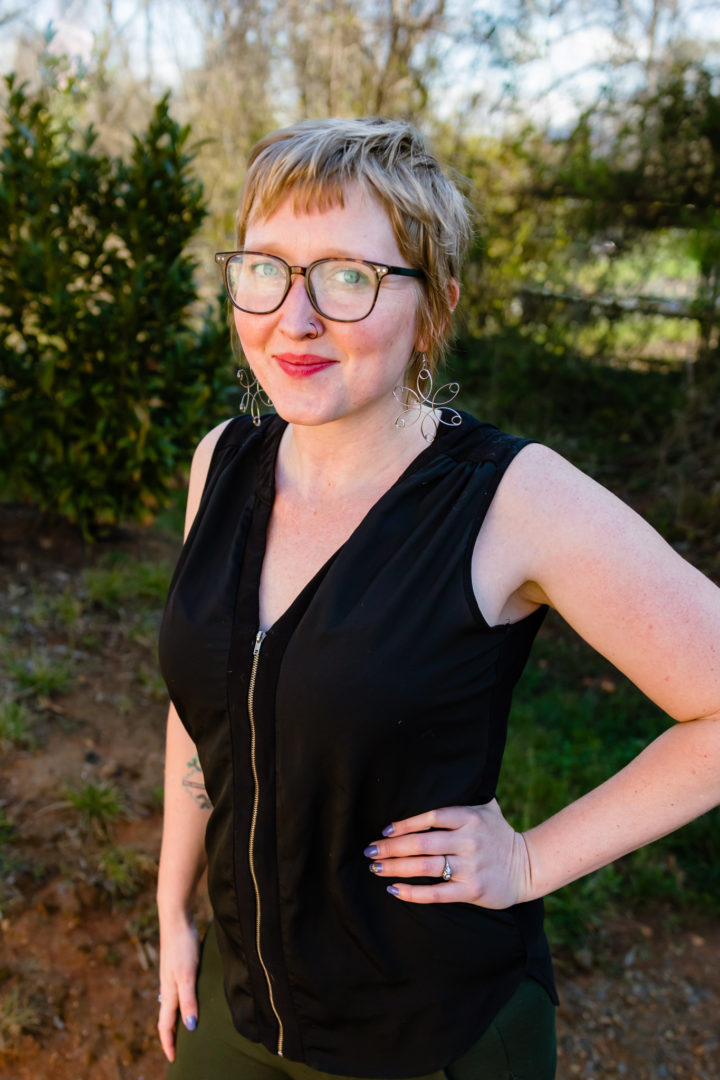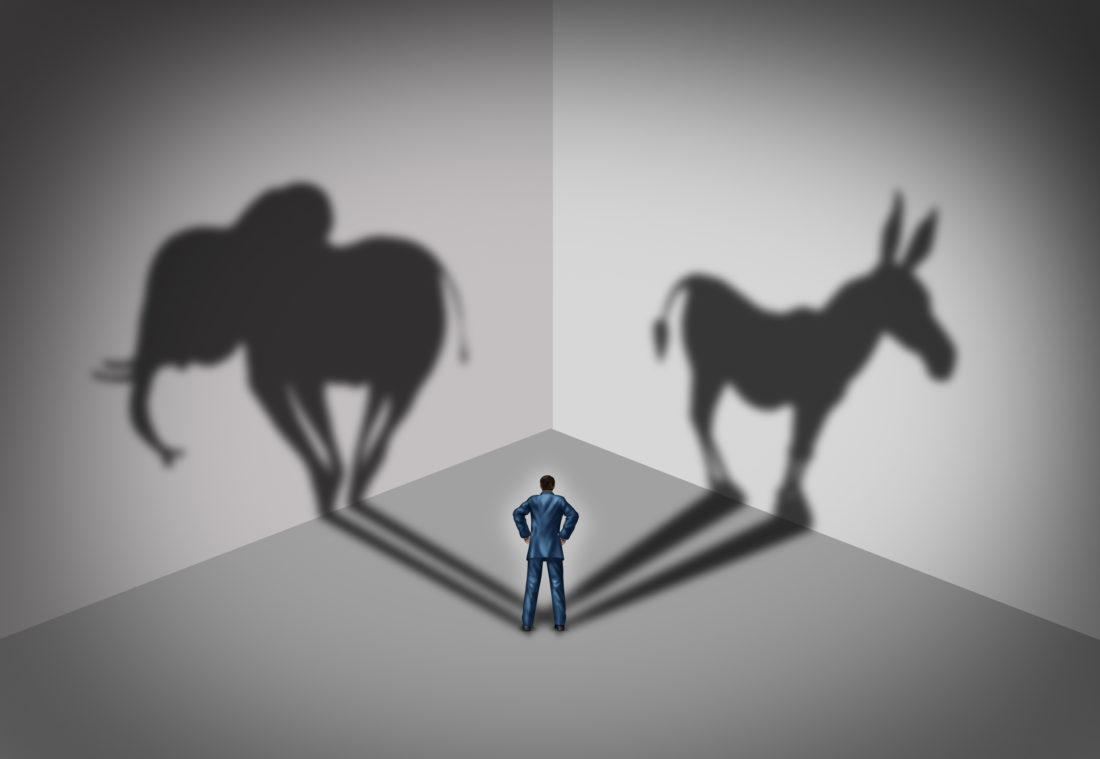Amber Hall is what many people would recognize as a Western North Carolina conservative. She loves that the people of WNC are hardworking and still say “yes, ma’am” and “no, sir.” She thinks some novels available in schools, like The Bluest Eye and The Handmaid’s Tale, have inappropriate sexual content. And as someone who commutes to Hendersonville from Polk County every day, she is concerned about politicians not knowing the price of gas.
But that doesn’t mean Republican candidates automatically receive Hall’s vote. She has been registered as an unaffiliated voter “as long as I can remember,” she tells Xpress.
North Carolina voters can register with one of three political parties — Republican, Democratic and Libertarian — or as unaffiliated. The last has become an increasingly popular option, both in WNC and across the state.
As of May 21, Buncombe County had over 83,000 unaffiliated voters, more than the county’s roughly 75,000 Democrats, 46,000 Republicans and 1,700 Libertarians. Carolina Demography, a project of the UNC Carolina Population Center, reports that unaffiliated voters in the state ballooned by 65% from 2010-21, from about 1.45 million to 2.4 million, and surpassed registered Democrats in March.
North Carolina created the unaffiliated voter registration category in 1978, notes Western Carolina University political science professor Chris Cooper. But registering as independent, he continues, didn’t gain steam until the Republican and Democratic parties opened their primaries to unaffiliated voters in 1988 and 1996, respectively.
As a group, the state’s independent voters defy easy categorization. Although Cooper notes that young people — millennials, specifically — and newcomers to North Carolina are driving the growth of independent voter rolls, “There is not one unaffiliated voter,” he says. “The reality is, there’s a variety of motivations [to register unaffiliated].”
Local unaffiliated voters who spoke with Xpress about their reasons for registering as independent shared a distrust of party-backed politicians, as well as a desire that the options on North Carolina ballots would represent a wider spectrum of political beliefs.
‘Fool me once’
“There are a true growing amount of independents who are disillusioned with the two-party system, and I think it’s awesome,” says real estate agent Grace Barron-Martinez, who says she registered as unaffiliated “as soon as I figured out it made sense to do so.” She feels particularly frustrated with Democrats for not fulfilling promises.
“I feel like Democrats say things that make it sound like they’re going to do things that I would want — but then in reality, they almost never do,” Barron-Martinez explains, citing student loan forgiveness as one policy the national Democratic Party has pledged but not prioritized.

Juan Holladay, an Asheville resident who works for the justice system in Buncombe County, voices a similar frustration. He is currently registered as unaffiliated, although he has registered as both a Democrat and a Republican to vote for specific candidates in previous elections. He feels that the current Democratic Party has what he calls a “fake liberal agenda” and has failed to back issues it claims to support.
“It seems like anything I’ve ever really cared about on a grassroots level, it’s always been the Democrats I have to fight first,” he says with a wry laugh. “If you get past that, you can get on with it and you can fight with Republicans.”
Holladay experienced what he alleges was excessive force by Asheville Police Department officers in 2011; that incident has led him to participate in several protests around police accountability in Asheville. He feels the Democratic Party is not addressing the issue of police brutality as seriously as he wants it to “at the local level and national level,” he explains. “My cynical point of view is that the Democratic Party’s job is to stifle progress in that direction.”
Barron-Martinez stops short of describing herself as disappointed in the Democratic Party. Instead, she says she’s come to expect that she’ll be let down by it. That’s why registering for a political party was off the table for her. “I won’t be fooled again. Fool me once …” she says with a chuckle.
As a self-described “leftist,” Barron-Martinez notes that some Democratic politicians pay lip service to traditionally liberal priorities like the environment. However, she argues that their actual policies or behaviors contradict their claims. “I almost think it’s more dangerous at this point to have people who are saying they’re my friend and they’re not my friend,” she explains.
Hall, who has more conservative leanings, echoes similar thoughts. “I don’t feel like it’s a real two-party system — I feel like it’s a uniparty system,” she tells Xpress. “Because the Democrats and the Republicans are doing the same thing, just in different ways.”
The Polk County voter particularly worries about what she sees as a boys’ club among Republican politicians: “As a whole, I feel like the Republicans are more, ‘Let’s do it backdoor, good-old-buddy system. We’ll meet over coffee and we’ll make this decision.’ (As to her frustration with Democrats, Hall says, “The other party is more screaming in your face, shove it down your throat.”)
Hall wants to see more transparency and accountability among the politicians who earn her vote. “We elected them there,” she says. “They should answer to us, the constituents.”
Reading the labels
Several independent voters interviewed by Xpress say they vote for candidates, not parties. Holladay, for example, voted for Republican candidate Ron Paul, a former U.S. representative from Texas, in the 2008 presidential primary.
“I tend to vote for candidates who are more aligned with my values rather than parties,” explains small-business owner Nicolette Baglio of Asheville. “I don’t really say I’m a Democrat, I don’t really say I’m a liberal [and] I’m definitely not a Republican.”
Baglio would like to see changes regarding approaches to Asheville’s homeless population. (The city’s 2022 point-in-time count found that unsheltered homelessness in Buncombe County had doubled since 2021.) “What I’m gathering from a larger crowd here — even Democrats — [is] people being extremely concerned about the homeless situation and how bad that’s gotten in Asheville and how it’s affected their downtown businesses,” she says.
Over the past several years, Baglio continues, “Some of the things in Asheville … have caused me and a lot of Democrats to move back towards the center on certain things.” More left-leaning politicians, whom she refers to “as having more extreme socialist views,” are prompting her to seek more middle ground in the voting booth.
Barron-Martinez says party affiliation can be misleading. For example, she does not believe David Hurley, who was a candidate for Buncombe County sheriff, or Doug Edwards, who was a candidate for Buncombe County district attorney, should have run as Democrats in their respective primaries. Their positions, she says, are more right-leaning.
“People just run as Democrats in Asheville, which shows how meaningless it is anyway,” she says. Barron-Martinez says she admires City Council member Kim Roney, a candidate for Asheville mayor in November’s general election, because she is running as an independent.
Baglio also wants voters to scrutinize candidates and show more caution before entrusting them with power. “I believe that we as voters have to do a better job and stop trying to elect shiny objects and really look at the candidate and their experience and what they can bring,” she says. “Because these positions are no joke.”
Locked out
Some unaffiliated voters tell Xpress they would prefer additional political parties in North Carolina that reflect a wider spectrum of views.
“A lot of people run as Democrats that I vote for, but generally speaking, that wouldn’t be my preference. I would much prefer to vote for a third party,” says Barron-Martinez. She expresses support for Matthew Hoh, a veteran in Wake Forest who has attempted to collect signatures to get on the state ballot as a Green Party candidate for Senate.
Yet new parties face substantial hurdles to be recognized in the state. According to the N.C. State Board of Elections, to be recognized as a political party, a group of voters must either have had its presidential or gubernatorial candidate receive 2% of the vote in the most recent general election; collect signatures from 0.25% of all registered voters, including at least 200 voters from three different congressional districts; or have a candidate for the most recent presidential election who was nominated for the general election in at least 35 states.
The Libertarian Party has met at least one of those thresholds since 2008. But the Constitution and Green parties, which earned recognition through the signature and presidential candidate methods, respectively, in 2018, lost their status in 2021 due to low vote counts.
Candidates who chose to run in partisan races without a party’s backing also have a challenging path to the ballot. They must gather signatures equivalent to 4% of all voters in the area they hope to represent by the day of the primary election for their office and do so by an earlier deadline than required by most other states.
“It’s just so hard to run and win as an unaffiliated,” says WCU’s Cooper. “There’s just no way to break through the noise, get on the debate stage and to tap into fundraising networks.”
But until a change occurs that enables more variety on the ballot, unaffiliated voters like Hall will scrutinize each candidate.
“The more I talk to people, the more they think like this. They’re like ‘This is crazy; this is getting out of hand,’” Hall explains. “What happened to doing what is best for us as Americans? Why does it have to be you [versus me]? Why can’t we just be Americans?”




We should (dis) organize the Cynicism Party, Victor Orban can be your Leader.
I think a goodly portion of the Unaffiliated Voters this primary were people like me — who took the advice of Asheville Citizen-Times writer John Boyle– and registered Unaffiliated so we could vote Republican in the Primary to get rid of Madison Cawthorn — and then in November, we can go back to vote our usual Democrat slate. This was the first time I did this –and it was Great to see how easy it was to get rid of Mr. Cawthorn.–thus Chuck Edwards became the Republican candidate — And that’s why we return as Democrats in November to defeat Mr. Edwards and get a qualified Democrat into the House. Let’s be Realistic! We don’t have viable third parties yet, so we have to accept that our votes will count ONLY if we vote Republican or Democrat. Don’t throw your vote away on Hope. Vote reality- in November vote Democrat or Republican.
Now it’s time to get rid of the “totalitarian neoliberals” who put “party” before “people,” and “partisanship” before “common sense.” It’s time to defeat the party of division and hate.
yep, Boyle’s idea was modeled after Limbaugh’s operation chaos to defeat Hitlary Clintonista!